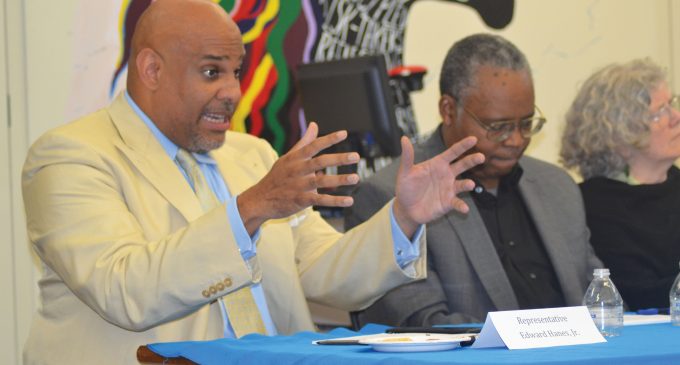N.C., local elected officials ponder education solutions
N.C. Rep. Edward Hanes Jr. shares his thoughts on proposed cuts to teacher assistant positions across the state and in the local school district.

Photo by Tevin Stinson
BY TEVIN STINSON
THE CHRONICLE
Last Friday afternoon the library at Parkland High School was anything but quiet as local and state elected officials, and members of the local school board sat down to discuss the future of education in North Carolina.
The panel discussion hosted by the Forsyth County Association of Educators (FCAE) featured N.C. Rep. Edward Hanes Jr., N.C. Rep. Evelyn Terry, County Commissioner Fleming El-Amin and members of the Winston-Salem Forsyth County Board of Education: David Singletary and Elisabeth Motsinger.
Throughout the two-hour moderated discussion, the panel of diverse leaders gave their viewpoints on a number of topics, including House Bill 13, the controversial law that reduces the number of children per classroom.
“We thought it was important to have different levels of government here today because each of these levels impacts our funding of public education,” said Rhonda Mays, FCAE president.
To jumpstart the conversation, Jeff Shu, a local middle school teacher, asked the panelists to share their ideas on how to shrink maximum K-3 class sizes, from 24 students to between 19 and 21 without cutting specials such as art, physical education, world languages and others. To meet mandated classroom sizes, some districts were prepared to lay off teachers that teach special classes like art and P.E.
Singletary suggested creating a budget that includes separate funds for special courses.
“The simple solution to small class sizes would be a bigger budget,” he said. “With a larger budget, we could allocate some money for the arts and physical education. This won’t fix all of our problems but it would be a start.”
Rep. Evelyn Terry said, “From my perspective, there is no solution until we sit down at the table and look at what we want North Carolina to look like in the future.”
Terry, who has been an advocate for STEAM (Science, Technology, Engineering, the Arts and Mathematics) infused pro-grams said a lot has changed across the state over the years and now is a time for a shift in public education as well.
“Factories that once employed 650 workers now hire 30 workers who work with a team of robots she said.” “There has to be a shift in our basic principles of how we manage and where we place our values.”
When asked about proposed cuts to teachers’ assistant (TAs) positions in Forsyth County to meet mandated classroom sizes, Rep. Hanes said it is important that TAs remain in the classroom because they are helping the students who need them most. He also encouraged parents to stand up and demand equity in their schools.
“If the school district is put into a position where some of these positions have to be cut, we know who will be harmed by that. These are some of the most desperate kids in the community,” continued Hanes. “When we know that is the case we must fight as hard as we can to keep TAs in the schools that are 99 percent free or reduced lunch and filled with black and brown students.”
The newest member of the Forsyth County Board of Commissioners, Fleming El-Amin, echoed Hanes’ statements about the importance of TAs. He suggested a portion of the budget be set aside for assistants across the county.
“We have to ensure we have TAs in the classroom,” he continued. “The TA component is fundamental for emotional support, relationship building and academic success.”
To wrap up the conversation, each panelist summarized his or her thoughts on House Bill 13 and the future of the Winston-Salem/Forsyth County School System. Motsinger, who holds an at large seat on the school board said, looking forward, the board has several difficulties facing it as it moves into the era of House Bill 13.
“We’re not ever going to get where you want to be with public schools if we don’t address the structural issues in our schools,” she said. “We have so many structures in our system that are crumbling in front of us.
Although the revised version of House Bill 13 gives school districts one year of flexibility, Motsinger said the revised version only delays the inevitable. She said this time next year we’ll be having the same conversation on how to meet state mandates.
“We don’t have 250 more teachers, we don’t have a place to put the extra classrooms,” Motsinger said. “There are so many pieces that are adding up to disaster. ”















